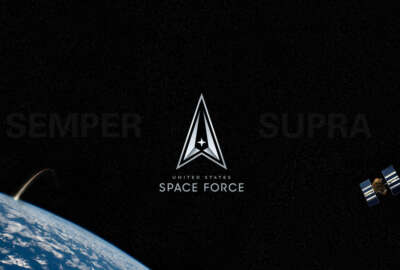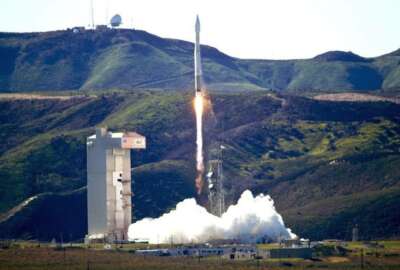Space Force’s talent management system focuses on development, work-life balance
The new military branch has billed itself as a “start from scratch” enterprise, that won’t be held back by traditions of other military services.
The Space Force is trying to make itself the most progressive military service when it comes to hiring and retaining service members.
The new military branch has billed itself as a “start from scratch” enterprise, that won’t be held back by traditions of other military services.
Gen. Jay Raymond, chief of space operations, and Roger Towberman, chief master sergeant of the Space Force, are promising the service will embrace a new kind of talent management that focuses on recruiting people who are not propensed to go into the military, prioritizes work-life balance and uses data to better place guardians.
“If there’s something measurable, like a 100 meter dash, I can line a bunch of people up and I can tell you who the best person is probably,” Towberman said. “But if I start talking about Kanye and Jay Z it gets a little mucky, right? If we started talking Belichick and Lombardi, some of you would debate that. So why do we think we can rack and stack people?”
The Space Force released its talent management strategy called The Guardian Ideal on Tuesday. The service currently has over 12,000 guardians, both military and civilian.
In it, the service outlines how it will be different from the other military services who are trying to dig themselves out of the trenches of an industrial-age human capital system.
“We must think differently about talent management for the Space Force to be successful,” the strategy reads. “We are creating a regulated market approach to talent management that integrates and strengthens equity, development, and human dignity. It empowers individuals to pursue pathways that are informed by both their preferences and an understanding of Space Force requirements To that end, we are designing and implementing a new talent management approach to tap into and build upon each person’s unique strengths to power interconnected high-performing teams.”
The strategy allows permeability within the service and professions so that members are not stuck in one profession they decided on when they were 18 years-old. It also will attempt to cater people interested in specific fields to follow their passions and give the military a wide array of options and colors for its needs.
The strategy is based around a handful of key concepts with concrete goals.
The Space Force plans to connect in a collaborative environment by creating interconnected, high-performing teams to take on big goals. To do that, the service plans to create service-wide expectations.
“The Space Force must take decisive action to establish new expectations for its teams in line with our operating construct and desired culture,” the authors of the strategy wrote. “These expectations must be clear and aligned to the new talent management construct.”
The service will also manage its career positions based on competencies and experiences guardians need to achieve instead of prescribed career fields.
“We are developing an organizational concept to maximize opportunities for full and part-time guardians. This model allows for permeability with industry and optimizes the work life balance and flexible career management options for all guardians,” the strategy states.
The plan will build competencies within its human capital system.
“We’re placing less emphasis on what you know today, and really getting after what is your potential,” said Jason Lamb, Space Force talent strategist, during a roundtable with reporters at the Air Force Association Conference Tuesday. “What are your talents? There are so many of us who don’t even know the limitations that society has placed on us. How many of those young ladies who have natural skills and abilities aligned to STEM, but were placed into academic programs that did not bring out that natural ability, or they were discouraged at home for whatever reason. If we can find that ability and nurture it and grow it when it really suits that individual, we think that’s a real path to tap into potential to achieve amazing things for the person, and service.”
The service will use different tools and tests to assess competencies and skills to inform developmental needs and help guardians understand where they need to grow to get to where they want to go professionally.
Guardians will be given feedback, coaching and mentoring to build on that development. Guardians will be assessed by boards for promotions and assignments as a whole individual and not as a handful of requirements.
The plan also focuses on something the service has been hyping since its inception: creating a digital service.
The Space Force will establish a digital cadre that will form a core of software coders, data scientists and IT experts. The service has created and filled 50 of those positions and will triple that by 2022.
“We have folks who have cyber expertise, some of it homegrown, some of it from years of working at computers. And leaders who have self-identified as technically savvy,” said Patricia Mulcahy, Space Force’s chief human capital officer. “We’ve sent them to a boot camp for some critical coders, and that’s a 12-week camp that will bring the wires together. Then space operators will go back out into their domain in an area or discipline that can apply what they most recently learned in just one particular discipline.”
The service will lean heavily on data to prove that its plan is working and will use data to automate processes to unburden guardians from mindless tasks.
The data goes to the individual level, some guardians are wearing rings that track sleep patterns and other biometrics to better their resiliency.
Copyright © 2025 Federal News Network. All rights reserved. This website is not intended for users located within the European Economic Area.
Scott Maucione is a defense reporter for Federal News Network and reports on human capital, workforce and the Defense Department at-large.
Follow @smaucioneWFED






